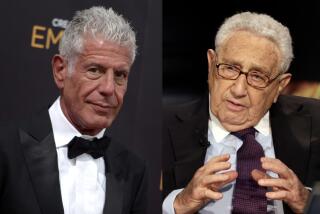An Old Pro Goes Home
Anatoly F. Dobrynin paid what was probably his last call at the White House on Tuesday before returning to Moscow. Nobody knows for sure why the Kremlin chose to bring him home after 24 years as the Soviet ambassador to Washington. But if the move means that the Politburo wants realistic advice on America and its likely responses to Soviet actions, it couldn’t find a better man.
Dobrynin’s first year in Washington coincided with the 1962 Cuban missile crisis. He has dealt with six U.S. Presidents, seven secretaries of state and seven American ambassadors to Moscow. Thus his personal experience in U.S.-Soviet relations is unmatched in either country, now that ex-Foreign Minister Andrei Gromyko has a new job.
Henry A. Kissinger, discussing the affable ambassador’s role in the “back channel” between President Richard M. Nixon and Leonid I. Brezhnev, recalls that he and Dobrynin conducted “preliminary negotiations on almost all major issues, he on behalf of the Politburo and I as confidant to Nixon . . . . With the President’s permission I would sometimes sketch our view as my own idea, stating that I was ‘thinking out loud.’ Dobrynin would then give me the Kremlin’s reaction on the same noncommittal basis . . . . It was a way to explore the terrain, to avoid major deadlocks.”
That was an extremely valuable function--one that, unfortunately, has not been used to maximum benefit by the Reagan Administration. It was useful even though Dobrynin never forgot for whom he was working, and neither did Kissinger.
To quote Kissinger again, “He knew how to talk to Americans in a way brilliantly attuned to their preconceptions. He was especially skilled at evoking the inexhaustible American sense of guilt, by persistently but pleasantly hammering home the impression that every deadlock was our fault.”
But critics and admirers both agree that Dobrynin understands how Washington and the U.S. political system work better than most Americans, much less Russians. Thus he must know that while the American people are not interested in conquering the world, and Reagan is not plotting World War III, Democrats and Republicans are nonetheless prepared to join to defend America’s interests and those of its allies.
According to participants in the Geneva summit meeting, Mikhail S. Gorbachev is badly in need of straight talk of this sort. Beneath his smooth exterior, they say, is a provincial who really seems to believe the party platitudes about American “imperialism.”
Dobrynin may or may not find it politic to tell his superiors the things that they need to hear but don’t want to hear. But, to the degree that he does breathe realism into Soviet assessments about the American political system and the competitive aspects of the U.S.-Soviet relationship, the 66-year-old diplomat’s transfer to Moscow will be invaluable to both his country and ours.
More to Read
Sign up for Essential California
The most important California stories and recommendations in your inbox every morning.
You may occasionally receive promotional content from the Los Angeles Times.










